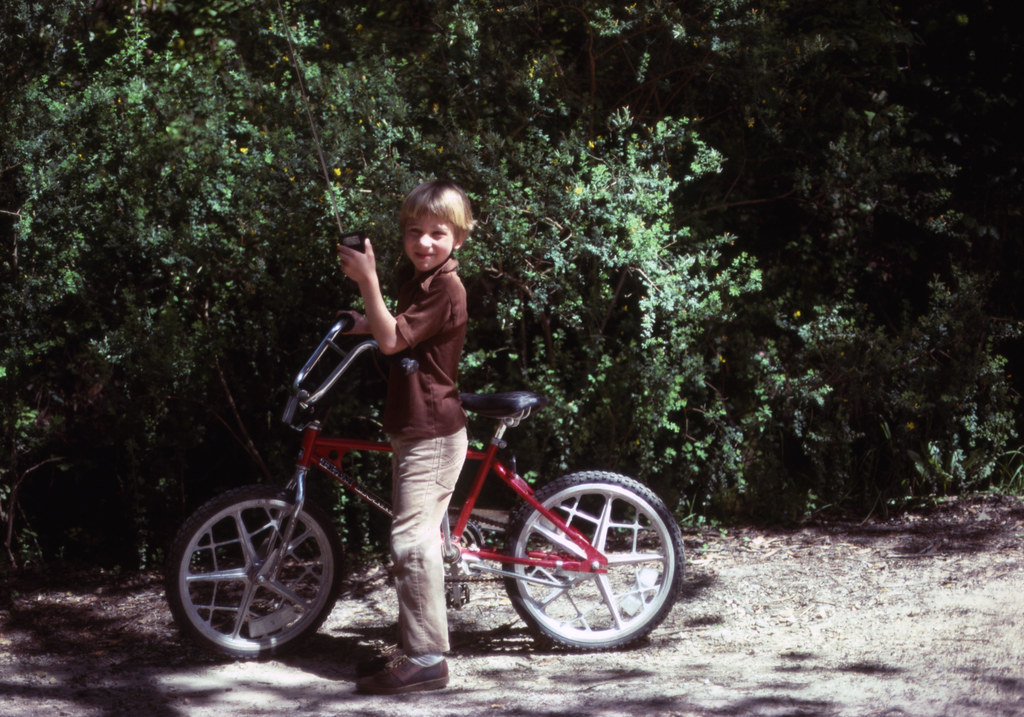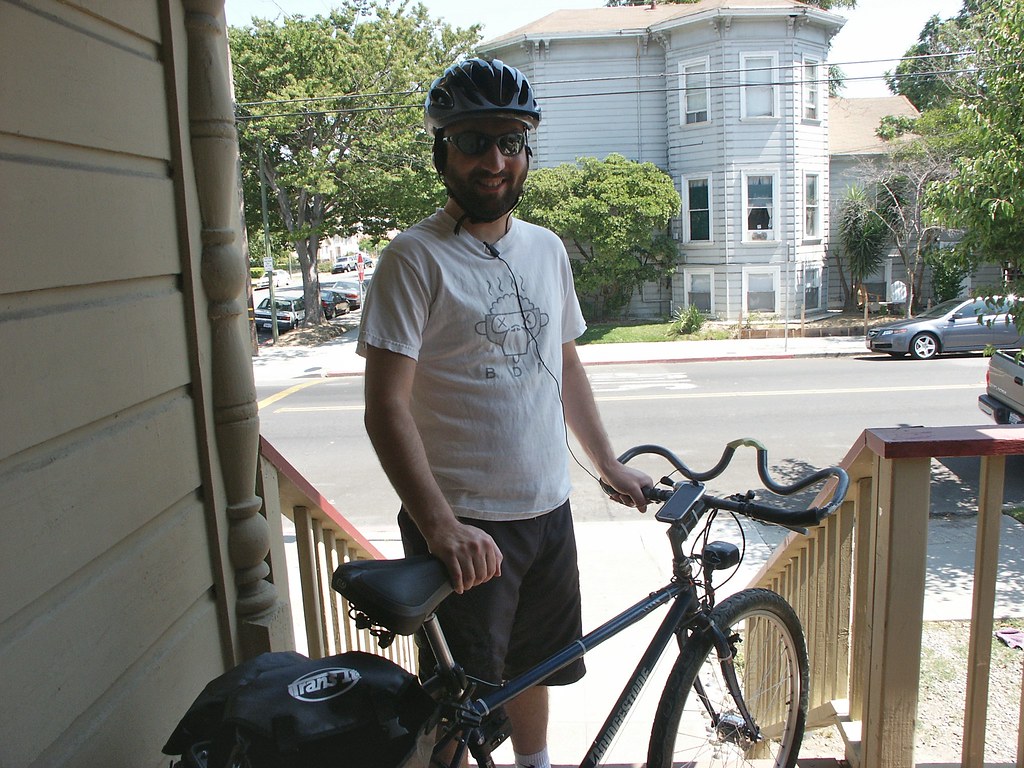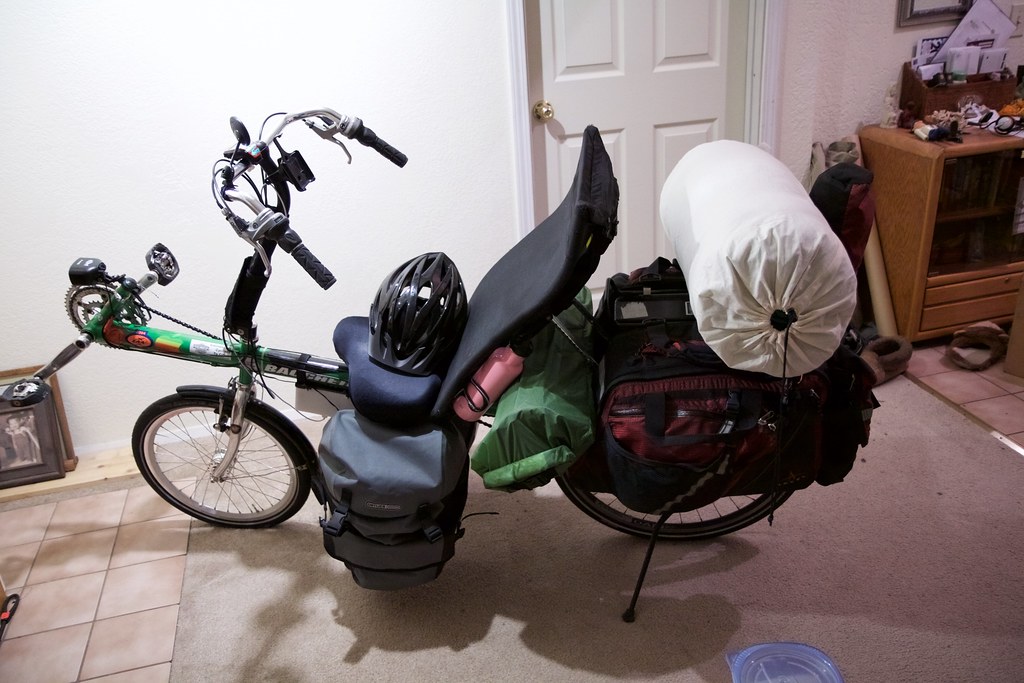First Day Exploring Paris
May 25, 2023 Filed under Curious, Introspection
I heard Nick leaving in the middle of the night, to catch his flight down to Portugal. The bike would be staying here until our paths crossed again in a few weeks for the journey to Edinburgh.
I fell back asleep and brought my total to 7 hours. Not bad. When I sat up and realized the sink and bathroom were up two sets of stairs, I decided I would sleep in the little upstairs room for the rest of my stay. I didn’t need all this mattress.
I took my first shower, and discovered that the bathtub was made of plastic and not anchored to the floor, so it tipped alarmingly when I reached for a towel. The curtain didn’t go all the way around, so the floor got wet. That was fine because the floor was a shower stall: The drain of the bathtub went into a hose, which went into a shower drain in the corner.
It was pretty funny. I’d been in some really janky places all over America, and yet I’d never used a setup this janky. Even the bare cement showers in RV parks usually compensated for their brutalist vibe by being spacious. It was a fact I would be learning repeatedly: Physical space is clearly the most expensive commodity in Paris.
I also noticed a sign by the dishwasher that I’d never seen before, even in the most uptight AirBnB units of Iceland or New Zealand:
This little apartment generates something like five grand a month for these people. What do they care if the silverware gets tarnished? Shouldn’t grandma’s fine utensils be somewhere else?
I shrugged. It’s not like I would be doing any cooking in this place more elaborate than heating up bread. Time to go see the city!
I rode directly down to Ten Belles, since it was on my “must try” list, but it was exploding with people. There was one tiny free table and a long line out the door. I picked streets at random and wound up near the canal again. On the other side was a café named “Residence Kann” that looked interesting, and not too crowded. They advertised a “mochacchino,” which turned out to be a lot like the mocha from Bluebottle back home. Very foamy and smooth, but with enough chocolate to make it a “real” mocha.
I decided I would eat at a different café at least once every day, and always order a mocha or the closest equivalent, so I could rank them all against my very severe and subjective 1 to 10 Worldwide Mocha Ranking Scale. “Residence Kann” got a respectable 7.5! They also served avocado toast, which is catnip to us middle-class wankers, so I got some.
This was the first place where I saw little signs on the tables indicating “no laptops”. I hadn’t seen any Parisians with laptops anywhere yet, so perhaps this was a city-wide custom and the signs are for the crude tourists (like me) to get a clue.
I wondered if it’s also considered insulting to the waitstaff to be sitting there doing the thing that makes you a much higher wage than they do, while they bring you food and wipe up your crumbs. But surely being a waiter in Paris earns a good wage?
Also, I wondered if a similar anti-laptop rebellion was coming to San Francisco and New York… If it wasn’t rolling in already. Back home I wasn’t seeing “no laptop” signs directly on tables yet, though I was seeing polite signs on walls asking that people limit their computer time to an hour or so. Maybe the Bay Area is too aware that people on laptops account for at least half the money being made there, and no one wants to upset them…?
I sipped my drink and felt fancy, and tried to conjure up a first impression of Paris, or at least this region of it. It was far more cramped and busy than I was expecting. The press of people was constant, and could easily get overwhelming. The importance of open spaces like the canals and gardens felt very clear to me.
I remembered reading somewhere that people often experience a kind of emotional shock, some time in the first few days, when they realize that the Paris they’re walking around is extremely different from the Paris they imagined. A depression sets in; what one might even call … ennui, and it lingers until they surrender, and adapt to the city on its own terms. Perhaps I was due for that kind of emotional journey in a few days.
I did a little reading, and learned some statistics:
2 million people live in the city of Paris. Somewhere between 7 and 13 million people live in the “metropolitan area” of Paris, depending on how you slice it. 68 million people live in all of France. So, as much as one fifth of all French people live in or around Paris. That’s a massively influential city.
For comparison: 8.5 million people live in the city of New York, while the entire state of New York has 20 million people in it. So if you’re “a New Yorker”, one third of the time that means you’re living in the city itself. This assumption by outsiders is so strong that people have to say they’re from “New York state”, just to make it clear that they’re not living in the city. Along the same lines, it would be plausible to change the name of Paris to “France City,” because when travelers think of France, they think of Paris. Meanwhile, four fifths of French people would have to start pointing out that they’re from “France THE COUNTRY, you dang tourist! Don’t lump me in with those urban jerks!”
I’m sure they would love that…
What’s intriguing to me is that, bustling as it is, Paris used to be much more populated, until the mid-20th-century when huge amounts of people migrated outward due to enhancements in rail and auto travel, and created massive suburbs. Only in the tail end of the 20th century has the population begun to move inward again.
I took a scroll through the history of Paris, and found an epic of war and revolution going back many hundreds of years, casting a long shadow, even over the World Wars. It was one bloody synthesis of king and church after another for 800 years until the French Revolution, then a bloody sequel in the form of the Napoleonic empire, then a confusing run of coup d’états and collapsed governments, with modern reforms and counter-reforms beginning some time after World War II and continuing through the century.
Thinking about this, and based on what I was seeing Parisians do around me just with regard to things like crosswalks, public gatherings, demonstrations, and trespassing, I concluded that the French must have a strong sense of independence from their government, and the laws and order it tries to impose. It’s truly an inspiration for the American attitude that if a law does not promote the common good, the law should be changed. Or in the case of Parisians, the law should be ignored, because the whole damn government is suspect, and may be collapsing some time in the near future anyway.
While I was musing over this, I had an interesting side-thought: Many of my fellow Americans have a strong aversion to talking about “politics” in public, or even in private when they’re not among friends. I suddenly had two questions about that. First: Why this aversion? And second: What does it even mean, to separate “politics” as a subject out from everything else?
As I packed up my stuff in the café and headed for my bike and another random ride around the city, I tried to conjure a few answers.
I figured that Americans try to avoid “politics” because it can cause friction among people who would otherwise just get along with the business of economic exchange, and relating to each other in their immediate context, e.g. at a baseball game or while standing in line at a supermarket. And Americans want to get business done, because they want to survive.
Put another way: There’s a subconscious feeling that peaceful coexistence with neighbors who disagree with you is more important than agreeing on how your government should be run, because you and your neighbor are right here face-to-face, and the government is way over there, potentially in another state, potentially thousands of miles away. This feeling might actually be the reason America still exists as a single country at this point. But what is this “politics” that people are so averse to discussing? My take was, it seems to be something encompassed by “policy” but actually more specific: “Politics” to the American seems to be about the people in government, and the political parties they belong to, and what those people and parties are like, or what they endorse.
For example, the regulation of America’s border with Mexico is certainly a political subject, and people will discuss that – cautiously – while considering details like our shared sense of responsibility to take in refugees, our collective status as a nation of migrants, our desire for respect of the rule of law, and our desire to prevent human trafficking and the movement of narcotics. But, statements like “The Democrats want lawless chaos instead of a border!” or “The Republicans want to separate migrant babies from parents!” … That’s what we call “politics.”
There are a lot of Americans talking “politics” online, on television, on radio… But there are also a lot more Americans who find it aggravating and would rather talk policy. Sadly, those discussions don’t drive mouse-clicks, finger-pokes, and ad revenue dollars, so it’s easy to get confused about whether they exist at all. At the same time, a lot of Americans have the luxury of not engaging with politics – or even policy – at all, because they do not belong to one of the sub-groups that the law is currently victimizing in some way. E.g. migrants, users of illegal drugs, pregnant women looking for medical care, people with non-Christian religious practices, and so on. So from one perspective, these people create stability, which is great … but from another, they create complacency, which is infuriating … and they need to be reached and told what their tax dollars are doing to other people.
Well, that was my quick packing-the-bike take on it, anyway. Next stop: Caféinoman, for a “detox juice blend” and a muffin. (I couldn’t handle any more coffee.) They were both pretty good!
Looking around, I got the sense that most of the dozen-or-so people in the café were fellow tourists. I wondered if I would ever get a clear picture of what Parisians are like, separate from tourists. Probably not. I mean, if you took all the bacteria out of a human body – benevolent or otherwise – would that give you a “clear picture” of the immune system?
Browsing the map, I decided to check out “Jules Verne Park,” because it sounded cool. I dropped my muffin in the street as I was riding along. Dangit! Well, food for the rats I guess.
“Jules Verne Park” turned out to be a kid’s play park, packed full of tiny humans and larger humans chasing them or sitting around looking exhausted. Not what I was hoping for. The noise made me crave a quiet space, so I rode back to the apartment, and used the remaining hour before my first work meeting to sort photos.
Three hours later the meetings were done and I’d written everything useful into a page of notes, so I walked around the corner to the café Nick and I had gone to, and ordered their all-day brunch. I chatted with folks on the phone and did more snacking – what a life I lead! – then strolled to the apartment and pitched myself into the upstairs bed. My brain was full of French history, computer code, and the roar of a thousand conversations that had pressed in around me all day.
Would this be the Paris routine for me? Cafés, history, parks, work, and bicycling? If so, I’ll take it!





























































































